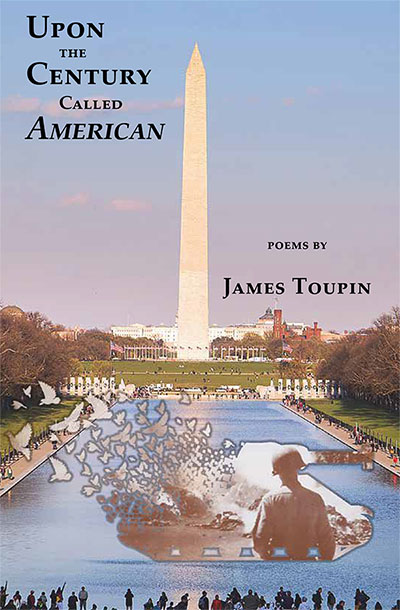Upon the Century Called American
poems by
James Toupin
ISBN: 978-1-964277-23-3, 132 pages, $17 (+ shipping)
Release Date: October 29, 2024
The Advance Sale Discount on this title has expired. For those who prefer to pay by check, the price is $22/book (which includes shipping & sales tax) and should be sent to: Main Street Rag, 12180 Skyview Drive, Edinboro, PA 16412.
PLEASE NOTE: Ordering in advance of the release date entitles the buyer to a discount. It does not mean the book will ship before the date posted above and the price only applies to copies ordered through the Main Street Rag Online Bookstore.
 James Toupin was born and raised in San Francisco, made a legal career in Washington, DC, and retired as general counsel of the US Patent and Trademark Office. During retirement, he has published poems in dozens of journals, garnering a couple of Pushcart nominations. His prior book-length publications have been in other genres, a translation of Selected Letters of Alexis de Tocqueville on Politics and Society, and a volume on misconduct issues in patent litigation. He now teaches in the law school of American University in Washington, DC, and works as a mediator.
James Toupin was born and raised in San Francisco, made a legal career in Washington, DC, and retired as general counsel of the US Patent and Trademark Office. During retirement, he has published poems in dozens of journals, garnering a couple of Pushcart nominations. His prior book-length publications have been in other genres, a translation of Selected Letters of Alexis de Tocqueville on Politics and Society, and a volume on misconduct issues in patent litigation. He now teaches in the law school of American University in Washington, DC, and works as a mediator.
In the pursuit to understand ourselves and each other, we can be surprised by how vividly our altered (and sometimes departed) family, friends, neighborhoods, and country insert themselves. Individually we are barely details in much grander landscapes, and at the same times centers of converging, pedestrian epics. Upon the Century Called American calls this myriad at-oneness, brings it to a living room or a mountain road or a national capitol, and has it live there… here and now for us. With a modest faith for the future and some sorrow for the stakes of all good stories, this collection moves and arrests. ~Andrew Gilman, Executive Director, The Agora Foundation
It is a long time since I’ve read a collection of poetry as consistently interesting and intellectually strenuous as James Toupin’s Upon the Century Called American. If W.H. Auden were alive and living in Chevy Chase, these are the poems he’d be writing–ironic astringent ruminations on persons and politics over fifty years of American history. Toupin offers genuinely civic poetry to an age that is desperately in need of such a humane, rational, and empathetic voice in the public square. ~Judith Plotz, Professor of English Emeritus, George Washington University
James Toupin eavesdrops across time, unearthing secret details of his family, his city, and of America. His verse travels the interior landscapes of memory and imagination. ~Joan Abrahamson
Some Problems of Translation
At the reading by Czeslaw Milosz,
Library of Congress, Washington, D.C.,
April 3, 1997.
Listening as the poet who has outlived his famous exile
reads an early work in the original,
I hear for a moment surface through his Polish
a rasping praise-song, nearly like tones of
the Hebrew I do not understand in shul
mixing celebration and lament:
here is a reason, more benign than most,
a native speaker might be suspicious
of immigrants chattering their tongues –
holiness might be rolling from their lips
and one not be able to understand.
…Not a mistake, of course, that the only person
I know who published verse in Polish
would make: the accent of the country
in which she was a poet rises, no doubt,
in her readings from the Haggadah
no less than it leavens her English,
though I could not say. Yet you will not
hear from her a word that Warsaw speaks,
not hear from her a syllable those neighbors could grasp
who were glad enough to see her go, one way or another.
She knows well enough what goes awry,
how she sounds snatched half-baked from the oven,
how her son at five discovered her strangeness,
realizing that none of the mothers of his friends
spoke with that softness of dough.
Every day she must locate herself,
as her neighbors need not who can lean on a world of words.
Poetry is a land she must not enter
if she is to keep her abandonment complete.
History makes for such losses.
This, even more, could be the shock that
those who have never needed to think of themselves
as strangers might fear — that, hearing
foreign voices in the streets they thought their own,
they should find themselves outmoded, passed by;
should see themselves the old that the new
purports to fulfill, excuse, and render superfluous;
should understand the testaments they have to pass to their children
to be gibberish in the futures they will inhabit.
Too far gone down the trek,
I almost failed to hear the poet start to recite in English
(you have to listen well to hear over his accent),
but hear him now explain the work of translation,
that he does it himself, and those named as translators,
who know no Polish, correct him:
they have good ears for the English,
they catch him where he stumbles.
You can almost see them, near the West’s edge.
In the late afternoon, the coolness
brings back the scent of eucalyptus.
They read aloud from sheets, drinking a regional wine.
The old man has wandered far to rest this way,
the vicious century a chronic heart murmur.
His younger colleague, himself renowned now in his own right,
reads out a phrase that has not quite made its way from Polish.
They try replacements, first this one, then that,
until they find one that he can attest
says most of the same things,
and moves to almost the same pulse,
as the Polish line did.
They laugh at what they construct,
building on Babel’s ruins.
A last audience question wants to know
what role faith now plays in his old age.
For a moment “faith” is misheard as “fate”.
“How can anyone say he has faith,” he asks,
at last responding. “Myself, I hope I have faith.”
The audience laughs. It is a laughter, rolling, subdued,
that wants to settle for a glibness
it has heard before and in its own tone,
knowing that in the original
there is always more to say.
Park Point, Duluth
for Arthur Toupin, 1921-2001
He seldom spoke about the past,
and we never knew whether he kept it unshown
because he wanted it completely lost
or wanted it completely his own,
so when Dad called on us to join him at
the iron clasp of the string of lakes
from which he had slipped, we would wait
for a treasure chest to spring open at his look.
Behind him the great horn sounded
and the roadway levitated,
and we were shipwrecked into an estate
where he thought he knew the ground –
a sandbar wide enough for a road lined with houses
miles long between bay and inland sea –
and he was lost: how to identify any
among the clapboard addresses?
We never found the store, only the story.
Loss chased them out of the terrain of fields —
father, mother and son six years old —
until they came to rest above an uncle’s grocery.
A first night’s rampage with cousins:
a streetlight smashed, hit by the rock he’d thrown,
and he heard someone’s “Cheese it, the cops,”
hissed in the best gangster-movie cant.
He made it, breathless, up the steps
and buried his head in a welcoming lap.
Only as the tears relented did he look up
to see not his mother but his aunt.
“Stop the car!” So we stopped.
The shingles were right. His eyes were bright.
This was the house they lived in five years later.
“In the room those curtains don’t quite conceal
Mom cooked; on this lawn Dad and I tossed the ball.”
I stood across the street and clicked the shutter.
A neighbor stood staring to make out
what these loiterers might be taking.
Not, it seems, what my father thought.
His mother remembered more than cooking
when we told her: “God, we were
coming out the seams in that trap,
cousins and aunts all on top
of each other, don’t you remember?”
His life was better able to recall.
He and I were sitting at the kitchen table
in the low-slung flat-topped house,
ocean-view but not booming “millionaire,”
two bedrooms, a study, two baths for three of us —
another boy with his dad and mom —
when he eased back in his chair:
“You know, this is all I ever worked for,
nothing extravagant, just enough room.”
The Lexicon of Race
The word itself seemed no less bland
than its companions in absurdity.
What could “Caucasian” mean —
that my ancestors, be they fjord-
or desert-dwellers, all hailed back
to some tribe booted out of some valley
in a central Eurasian mountain range?
Or “Mongoloid” — that a characteristic
fold about the eye kept out the sand
a Gobi windstorm might kick up?
At least “Negro” tried to describe,
if from an attitude foreign to that skin,
meaning “black” in some language
I did not speak, and took no mythic stab
at delving to the root of a “race”
(though had I forgotten that Africa
was so often described as “darkest?”)
How close it came to insult, though,
I heard in small-city poobahs interviewed
in black and white on then-new boob tubes
pronouncing “Nigra” with a deliberateness
that flashed the most transparent of deniabilities,
telegraphing the lazy disdain that sloughed off
another way of speaking for more private spaces.
Once seen through, it all came down
like a three-legged stool with one leg sawed off,
the “science” that made as if to speak for nature
in divvying the human into races.
All its rubrics fell off the common carrier
of daily parlance, taking with them
variants and deviants. Yet the slur
slid itself off for use behind closed doors
like a password to a club whose snob appeal
lies in coming up with someone to snub,
occasionally surfacing to maraud in the open.
The best I can claim is that I didn’t belong.
The denigrated, though, sneer back the affront,
making it boast its negation, digging difference.
Human: the species that makes its home in language.


 James Toupin was born and raised in San Francisco, made a legal career in Washington, DC, and retired as general counsel of the US Patent and Trademark Office. During retirement, he has published poems in dozens of journals, garnering a couple of Pushcart nominations. His prior book-length publications have been in other genres, a translation of Selected Letters of Alexis de Tocqueville on Politics and Society, and a volume on misconduct issues in patent litigation. He now teaches in the law school of American University in Washington, DC, and works as a mediator.
James Toupin was born and raised in San Francisco, made a legal career in Washington, DC, and retired as general counsel of the US Patent and Trademark Office. During retirement, he has published poems in dozens of journals, garnering a couple of Pushcart nominations. His prior book-length publications have been in other genres, a translation of Selected Letters of Alexis de Tocqueville on Politics and Society, and a volume on misconduct issues in patent litigation. He now teaches in the law school of American University in Washington, DC, and works as a mediator.